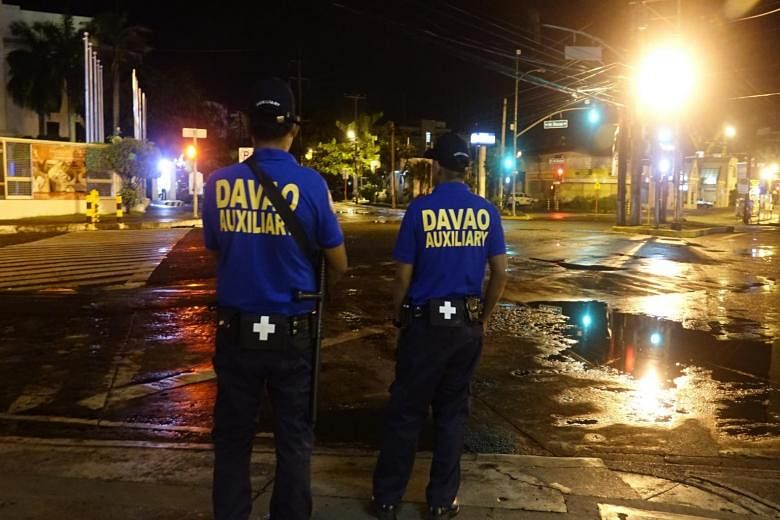DAVAO CITY - President Rodrigo Duterte said on Wednesday (May 24) he will be "harsh" in imposing martial rule on the war-torn southern island group of Mindanao after Islamic militants laid siege to a major Muslim city there.
"Martial law is martial law. My countrymen, you've experienced martial law. It would not be any different from what President Marcos did. I'd be harsh," Mr Duterte said in a video recorded just before he headed back to the Philippines from Russia.
He was referring to the two-decade rule of Ferdinand Marcos, marked by widespread human rights violations and massive corruption, which ended with a "People Power" revolution in 1986.
"If it would take a year to do it, if it's over within a month, then I'd be happy," Mr Duterte said in the clip posted online by the government. Presidential spokesman Ernesto Abella initially said martial law in Mindanao would last for 60 days.
The president, who won last year's election on the back of pledges to improve law and order, had cut short his scheduled five-day official visit to Russia to deal with the brewing crisis in Mindanao, which makes up roughly one third of the country and is home to 20 million people.
About a hundred militants from the Maute group mounted attacks across Marawi city, some 814km south of the capital Manila, on Tuesday (May 23), after security forces raided an apartment at the city's Basak district to arrest Isnilon Hapilon, designated by the Islamic State in Iraq and Syria (ISIS) as its top man in South-east Asia.
Hapilon, chieftain of the small but brutal Abu Sayyaf group, has a bounty of up to US$5 million from the US State Department for his arrest.
Security analysts say he has been trying to unite Filipino militant groups that have professed allegiance to ISIS. These include the Maute group, which is based near Marawi.
Defence Secretary Delfin Lorenzana disclosed late on Tuesday that the militants briefly occupied Marawi's city hall and city jail, a hospital, and a university. They later torched the jail, a church, and two schools.
Mr Lorenzana said a policeman and two soldiers were killed in clashes with the militants.
Ms Noddy Summer, a teacher in Marawi, appealed to the military in a phone interview with the ABS-CBN News Channel on Wednesday to refrain from conducting bombing runs or artillery barrages to dislodge the militants, although it was unclear whether the militants were still in control of Marawi's main road and two bridges leading to the city.
Representative Rodolfo Farinas, the majority floor leader, said Congress would await Mr Duterte's report on his declaration of martial law in Mindanao, in line with provisions of the Constitution.
Mr Duterte has yet to issue a formal proclamation, and Congress, where the president has a "super-majority", can decide either to approve or reject it.
Two senators have said they support the declaration, saying it is necessary to deal with the growing terrorist threat in Mindanao.
Senator Risa Hontiveros, an independent, on Tuesday called on the government to "allay the fears and confusion of the public".
It is not yet clear how martial rule will be enforced in Mindanao. But in Davao, Mayor Sara Duterte, the president's daughter, on Tuesday ordered police to put up more checkpoints and advised those intending to come to the city to postpone their plans, unless they had pressing matters to attend to.
She also told reporters she was planning to suspend the writ of habeas corpus, allowing security forces to arrest and detain suspects indefinitely without securing warrants.
A curfew is also being planned, said Ms Duterte.
In metropolitan Manila, Quezon City Mayor Herbert Bautista has ordered police to step up surveillance of suspected terrorist cells.
Government troops have been intensifying offensives on the Abu Sayyaf's strongholds in the Sulu archipelago and last month killed about 36 Maute group fighters when aircraft bombed their mountain lair in Lanao del Sur province, in Mindanao.
The Abu Sayyaf has kidnapped hundreds of Filipinos and foreigners since the early 1990s to extract ransoms. The militants beheaded an elderly German early this year and two Canadians last year after ransom demands were not met.
It is also blamed for the country's worst terrorist attacks, including the 2004 bombing of a ferry in Manila Bay that claimed more than 100 lives.
The Maute group, meanwhile, has engaged in repeated deadly battles with the military over the past year in rural areas around Marawi.


